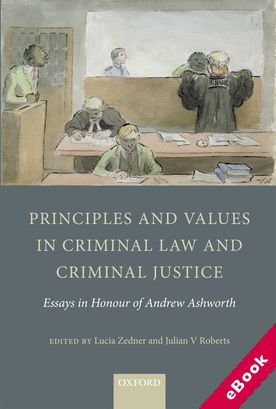
The device(s) you use to access the eBook content must be authorized with an Adobe ID before you download the product otherwise it will fail to register correctly.
For further information see https://www.wildy.com/ebook-formats
Once the order is confirmed an automated e-mail will be sent to you to allow you to download the eBook.
All eBooks are supplied firm sale and cannot be returned. If you believe there is a fault with your eBook then contact us on ebooks@wildy.com and we will help in resolving the issue. This does not affect your statutory rights.
Celebrating the scholarship of Andrew Ashworth, Vinerian Professor of English Law at the University of Oxford, this collection brings together leading international scholars to explore questions of principle and value in criminal law and criminal justice.
Internationally renowned for elaborating a body of principles and values that should underpin criminalization, the criminal process, and sentencing, Ashworth's contribution to the field over forty years of scholarship has been immense. Advancing his project of exploring normative issues at the heart of criminal law and criminal justice, the contributors examine the important and fascinating debates in which Ashworth's influence has been greatest.
The essays fall into three distinct but related areas, reflecting Ashworth's primary spheres of influence. Those in Part 1 address the import and role of principles in the development of a just criminal law, with contributions focusing upon core tenets such as the presumption of innocence, fairness, accountability, the principles of criminal liability, and the grounds for defences.
Part 2 addresses questions of human rights and due process protections in both domestic and international law. In Part 3 the essays are addressed to core issues in sentencing and punishment: they explore questions of equality, proportionality, adherence to the rule of law, the totality principle (in respect of multiple offences), wrongful acquittals, and unduly lenient sentences.
Together they demonstrate how important Ashworth's work has been in shaping how we think about criminal law and criminal justice, and make their own invaluable contribution to contemporary discussions of criminalization and punishment.